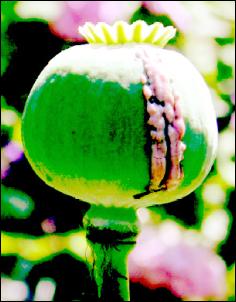UN opium production on the rise in Afghanistan
UN survey finds opium production on the rise in
Afghanistan
The United Nations released a survey today showing that opium production is on the rise this year in Afghanistan, by far the world's biggest producer of the drug.
The survey found the area under opium poppy cultivation has jumped by 8 per cent over the last year, to 80,000 hectares from 74,000 hectares. Now there is opium cultivation in 28 of Afghanistan's 32 provinces, up from 18 in 1999.

Production has also increased, rising by 6 per cent to 3,600 tonnes from 3,400 tonnes, and about 1.7 million people - or 7 per cent of Afghanistan's population - are involved in the industry.
The annual survey, which took in fieldwork and analysis of satellite images, was conducted by the UN Office on Drugs and Crime (UNODC). The Office said the results confirm that Afghanistan is responsible for about three-quarters of the world's output of opium.
Speaking at a press briefing in Moscow on the launch of the report, UNODC Executive Director Antonio Maria Costa issued a dire warning about the situation.
"The country is clearly at a crossroads: either major surgical drug-control measures are taken now, or the drug cancer in Afghanistan will keep spreading, metastasise into corruption, violence and terrorism," he said.
Mr. Costa praised anti-drug efforts by the administration of Afghan President Hamid Karzai, including a ban on opium cultivation and trafficking, and the setting up of a counter-narcotic directorate.
But he warned that drug cartels threaten to undermine President Karzai's efforts to promote democracy and the rule of law.
UNODC says it estimates that total income from the farming and trafficking of opium this year may equal about half of Afghanistan's gross domestic product.
The value of the opium harvest declined this year to $1.02 billion, down from $1.2 billion, but that was due to a sharp drop in the price of fresh opium to $283 per kilogram this year, down from $350 per kilogram, because of the increased amount of opium flooding the market.
UNODC says opium production has been a serious problem in Afghanistan since the late 1990s, when the Taliban controlled Afghanistan.


 John P. Ruehl, IMI: Alongside China’s, Which Social Credit Systems Are Developing?
John P. Ruehl, IMI: Alongside China’s, Which Social Credit Systems Are Developing? Palestinian Journalists Protection Center: Farewell To The Last Lens - The Story Of Journalist Yahya Sobeih’s Martyrdom
Palestinian Journalists Protection Center: Farewell To The Last Lens - The Story Of Journalist Yahya Sobeih’s Martyrdom UN News: Pandemics To Pollution - WHO Assembly Delivers Landmark Health Decisions
UN News: Pandemics To Pollution - WHO Assembly Delivers Landmark Health Decisions NZDF: New Zealand-led Task Force, With Royal Navy, Seizes NZ$1b Worth Of Drugs In Arabian Sea
NZDF: New Zealand-led Task Force, With Royal Navy, Seizes NZ$1b Worth Of Drugs In Arabian Sea ACI Asia Pacific: Air Connectivity Ranking - Asia-Pacific Reports 13% Growth; Middle East Leads With 28%
ACI Asia Pacific: Air Connectivity Ranking - Asia-Pacific Reports 13% Growth; Middle East Leads With 28% Save The Children: Ukraine - Air Raid Sirens Halted One In Every Five Lessons This School Year
Save The Children: Ukraine - Air Raid Sirens Halted One In Every Five Lessons This School Year